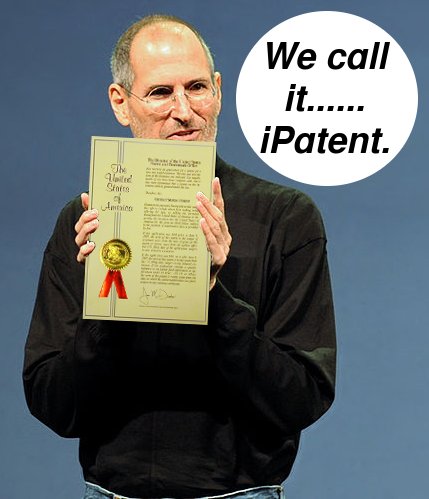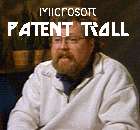10.02.11
Posted in Apple, Asia, GNU/Linux, Google, Microsoft, Patents at 11:22 am by Dr. Roy Schestowitz
Seoul besieged again

Summary: A look at Apple’s and Microsoft’s relationship with Samsung (one of the two major Korean companies in this area) and what we can learn from it
SAMSUNG is a hardware giant located at a nation that thrives in production of goods. Samsung is about an order of magnitude larger than Apple, at least in terms of workforce. Not so long ago Samsung surpassed Apple in terms of certain sales and became the largest distributors of Android (even if taxed by Microsoft), amongst other things. It painted a large target on Samsung’s behind, so Microsoft wanted more “royalties” and Apple sought embargoes one country at a time (fortunately there is no global patent system, at least not yet). The strategy has not been particularly useful to Apple; ever since it started suing Android companies using patents (starting with HTC) there has been a great deal of blowback, even from US-based carriers. Apple started alienating too many existing and potential partners, which would be harmful in the long term. At the end of last month we saw Apple taking a small step back (withdrawing patent claims) and now it is complaining about Samsung’s patents. Apple got a little scared and removed patent allegations, so now it seems to be more afraid of Samsung’s own patents. Just remember who started all this confrontation. Apple started it, whereupon pundits said that Apple must have been out of its mind. Some days ago it was reported that Apple significantly reduced its iPad orders; maybe Samsung just won’t help make these. By suing its own producers, Apple made a foolish decision. Microsoft took a different approach with its longtime partner Samsung and to cite Muktware, it did not try to get ridiculous trademarks or manufacture fake 'evidence' to block Samsung’s products. Instead Microsoft tried turning Android/Samsung devices into its own. Here is an article to be aware of:
Apple has been misuing its deep pockets and abusing the legal system to weaken competition. There is good news for competitors, the USPTO has rejected Apple’s trademark claims over ‘multi-touch’. Apple applied for the trademark in 2007 when it launched its iPhone. The USPTO rejected the trademark on the basis that the term is too generic or broad. Apple also holds a trademark on AppStore, a term used for app stores. There is an ongoing legal battle between Apple and Amazon over the use of this genetic term.
Apple is not much of a producing company. It’s a design, marketing, and branding company. This is why it tries so hard to restrict use of vocabulary, product appearance, etc. Apple even hired Viagra experts for this task. The manufacturers of “Apple”-branded products could just do it equally well themselves, a lot more economically too.
“The scenario makes is rather obvious that software patents are a major danger to coders.”Then there is Microsoft, which used to be a monopoly expert (removing choice from the market by crime and underhanded tactics) and has recently become more of a patents aggressor because people fought for choice (more on that in an earlier post). Microsoft is still trying to figure out how to make a profit from other people’s work and in the process it resorts to racketeering, collusion, secret deals, and old partners like Samsung (interesting take), which are all just a convenient way to get around having to face Google. This whole situation is fascinating because, assuming Microsoft can turn patents into its major cash cow, the market for software development will just die a little more. It will become a market of patents, just as Microsoft’s patent troll once envisioned it. Rather than write software (code) people will write words and then extort everyone who writes code implementing an abstract description of it. The scenario makes is rather obvious that software patents are a major danger to coders.
In a truly bizarre article whose headline resembles old propaganda for software patents (“Software Developers Must Be Properly Rewarded”) the case is being made based on the Samsung-Microsoft ‘deal’. If this illustrated anything at all, it is that software patents have absolutely zero value to Korea. It is only secret trade agreements that can somehow make Korea fall on its sword and fall for software patents.
Samsung is now paying Microsoft for something it never made, not even in code, passing the cost to customers, who will in turn reward Microsoft rather than Google. How does that encourage software development? The developers are not being paid.
To use the words of one blogger:
Microsoft has a large advantage in its quest to go after and collect royalties from those that it deems necessary as a direct threat. Microsoft has risen up with full force against Android, just after Windows Phone 7 started to appear. Coincidence? I don’t think so. Most recently it was announced that Microsoft had an “agreement” with Samsung, yet another manufacturer of Android devices. This agreement? It’s been rumoured that Samsung will need to pay close to $5 to Microsoft for each Android phone manufactured and sold. And so this is one side of the blade that Microsoft is swinging all around. Microsoft is using its vast array of patents to frighten phone manufacturers into paying royalties, in order to avoid being sued. Ingenious? Yes, because there’s another side of the blade that didn’t occur to me until recently. Samsung, being a manufacturer of Android devices, could manufacture devices for other operating systems as well, including Windows. Why not? If Microsoft is going to charge Samsung a set fee for each Android phone, yet allow Samsung to manufacture and sell Windows phones with no fees, what incentive would there be for Samsung to continue manufacturing Android devices? Not too many at the rate things are going. The only thing keeping Samsung interested in Android is the market demand for devices that run the Android OS. So Microsoft has two sides to their blade, they swing it to either side and they win. And Google? They seem to be defenseless at the moment while vendors of its software are being bullied by Microsoft.
This is an observation we made over 4 years ago, just after the signing of the Novell deal. The patent deal between Samsung and Microsoft is also over 4 years ago. This is helping non-practising ‘industries’, making developers devalued while “Increas[ing] in demand for Trained Patent Professionals” as this new article puts it:
In India, software is protected under the Copyright Act and not the Patent Act (as in many western countries). However, Indian IT companies have filed patent applications for their software in other parts of the world and these companies continue to seek non-software patents in India. Many of them have also filed business method patents in U.S. As Indian IT companies restructure their operations for high value service offerings, they are focused on innovation and intellectual property generation and protection in India and abroad.
The passage of jobs from engineers to lawyers (who serve a protectionist agenda) is a sad reminder of a society where the rich get richer and smart, honest people get thrown aside. The rise of terms like “Intellectual Property” in the news tells us that there is a strong push to indoctrinate the public all across the world to “respect IP”. Cablegate is full of examples that demonstrate it (we shall dive into more of that later this year). █
Permalink
 Send this to a friend
Send this to a friend
10.01.11
Posted in GNU/Linux, Google at 8:19 am by Dr. Roy Schestowitz

Summary: Despite FUD from Microsoft and Mobbyists, Android is a free platform, both in terms of code and in terms of price
ADVOCACY of Linux in the mainstream often borrows a great deal from the success of Android, which in my personal view does not need much help from self-appointed “advocates”. Android is a free platform which is mostly used for spreading proprietary applications and games. It is not necessarily a bad thing, but the ultimate goal from many people’s perspective is to spread Free software, not just Linux. Platforms like Ubuntu do this a lot better.
“Just because Microsoft is extorting some companies that sell Android doesn’t make it any less free.”Ensuring the future freedom of developers is an essential goal on the path to attaining other goals. Without access to source code and permission to modify it, our generation gets left in the dark, harming both users and developers who can help them. The only ones gaining are source masters, those with exclusive access to the source defining behaviour of computers. In the case of Android, a lot of control over the phone is offered through the opening of the platform and encouragement of jailbreaking (Motorola withdrew barriers after people had complained); contrariwise, when it comes to “apps” hosted on the platform, it is a very closed and restricted world. This is not entirely the fault of Android/Google, FOSS licences, or even Linux. There are market dynamics that are hard to antagonise, especially where there are third-party developers involved. These don’t inherit their values and philosophy from Android because more often than not they target multiple platforms (usually iOS as well).
The bottom line is, while Android is an open/free platform, Android phones as a whole typically contain or can carry non-free bits. But blame should be placed not on Android developers who work for Google; In fact, if MeeGo managed to gain the market share of Android, it too would probably find itself in a similar position. As for WebOS, it was closed (the platform) all along, so Android is not the least permissive among Linux-based mobile platforms. It is rumoured that Amazon might pick WebOS up.
Another point worth making is that Android is free as in commodity, not just free to modify and redistribute. Just because Microsoft is extorting some companies that sell Android doesn’t make it any less free. It just makes those particular phones from those particular companies Microsoft-taxed appliances. Android itself is free. This is unlikely to change any time soon. But there are attempts to change perceptions, especially with Microsoft spreading FUD about being sued unless paying Microsoft for Android. It is a subject we have been covering for years. █
Permalink
 Send this to a friend
Send this to a friend
09.30.11
Posted in Apple, Asia, Google, Patents at 9:32 am by Dr. Roy Schestowitz

Original photo by Matt Buchanan; edited by Techrights
Summary: Apple’s strategy against competition that is headquartered in Asia (and Linux based) results in more blowback than Apple must have foreseen
Apple chose to cheat rather than compete. It sought to embargo competition which is based on Android and now comes the blowback because Linux has many friends in Asia (a relationship of convenience).
Several days ago we saw Verizon batting against Apple and now we see T-Mobile. Reportedly, “T-Mobile has joined US comms giant Verizon in backing Samsung’s fight against Apple, which has requested a preliminary injunction against the Korean manufacturer’s products.
“T-Mobile’s argument is essentially the same as that made by Verizon last week, in that the mobile operator does not want a ban on 4G devices in the US during the busy Christmas shopping season.”
It’s actually made worse for Apple because VIA too entered the ring, which complicates matters for Apple and makes the case against Samsung rather multi-dimensional. The Samsung case gets a lot of coverage because two dozen actions have been invoked so far and the ITC starts putting Apple at risk of having its own products embargoed. Quoting IDG: “The U.S. International Trade Commissions said Tuesday that it will open an investigation of Apple based on an earlier complaint it received from handset maker HTC.
“Apple now collaborates with other Linux foes.”“The investigation will cover “certain electronic devices with communication capabilities, components thereof, and related software. The products at issue in this investigation are computers, tablet computers, and smartphones,” with Apple named as the respondent.”
Apple must feel like an unlucky punk as more and more such cases pile up. Meanwhile it loses sight of technical progress and Android keeps gaining. All this litigation sure can be distracting. Apple is not going to win, not overall. The triumph of Linux in mobile seems inevitable. Apple now collaborates with other Linux foes. █
Permalink
 Send this to a friend
Send this to a friend
Posted in GNU/Linux, Google, Microsoft, Patents at 8:10 am by Dr. Roy Schestowitz

Summary: More analysis of Microsoft’s ‘Android tax’, the involvement of its former CTO in patent extortion, and lobbying through front groups
TECHRIGHTS has spent several years covering and warning about Microsoft’s aspirations to tax GNU/Linux — an effort that began in 2006 when Microsoft signed a patent deal with Novell.
Novell has been sold and broken down into components that include SUSE. It did not take long for SUSE to become Microsoft sponsored (through cash injection), which works well for Microsoft because SUSE legitimises a ‘Linux tax’. This is a very simple fact that Jos from OpenSUSE has been arguing with me about. It was actually Jan from Red Hat who came out in my support in the face of heckling from Jos, whose position is understandable given the company which pays his salary. Here he is speaking about openMind, an event which we are told has been hijacked or exploited by Microsoft and its friends to change perceptions (our source asked not to be quoted verbatim on this). “At the (pretty cool) openMind conference in Tampere, Finland,” writes Jos, “it came up that a big advantage of Tumbleweed is that it always has the latest hardware support. Thanks to the rolling release, Tumbleweed comes with the latest Linux kernel which plays a big part of the hardware support of a Linux distro.”
Just bear in mind that today’s openMind is a pro-Microsoft event (as much as it can be given the “open”) and this includes the Nokia which is tied to Microsoft and obviously suffers more massive layoffs this week, like most companies that enter Microsoft’s nest. A couple of days ago we learned that following Microsoft’s intervention inside Nokia, Intel too was moving away from MeeGo and establishing Tizen with the Linux Foundation instead. This is a success story to Microsoft, which managed to paralyse a great GNU/Linux distribution for mobile devices, vehicles, etc. That’s just the way Microsoft operates. When it comes to Android, Microsoft has become a major parasite and SJVN writes that: “According to a Goldman Sachs‘ tech analyst note, as reported by Business Insider, that’s exactly how Microsoft is cashing in on Android. Goldman Sachs estimates that Microsoft will pick up $444-million in revenue from its Android patent deals for fiscal year 2012. For those of you playing at home, that’s $3-$6 per Android device. Yes, that may well be more than Microsoft makes from its own troubled mobile operating systems.” For code it never wrote at all; this cost is being passed to customers.
“This is a success story to Microsoft, which managed to paralyse a great GNU/Linux distribution for mobile devices, vehicles, etc.”In a new article by Richard Hillesley he calls it a protection racket and the foreword explains: “Software patents are a racket for the protection of incumbent cartels and monopolies against innovation and competition, says Richard Hillesley
“The casual observer could be excused for believing that litigation and teams of lawyers were the largest part of technical innovation in the computing industries, such has been the part played by litigation and threats of litigation around patents, copyrights and trademarks during recent years.
“Litigation has become a highly profitable way of doing business. Big money can be made for a relatively small outlay and litigation predicated around the “ownership” of ideas, patents and copyrights requires minimal investment in staff, research, manufacture or the trading of hard goods.
“In fact all these activities have become superfluous in some areas of industry where possession of “Intellectual Property” has become the primary objective of trading. Pick the right target to make a claim against and the chances are that they will pay up before it gets to court. Throw enough patents at the competition, and you can slow them down. Make a patent stick and you can make a lot of money.”
More people need to change this emerging status quo, which normalises atrocious behaviour and makes it “business as usual”. As ECT put it, “Samsung, Microsoft Deal Tugs at the Rug Under Google’s Feet” because Google was never even given the chance to defend its own platform from this extortion. We wrote about it yesterday and showed that media distortion makes things worse, with Microsoft boosters portraying it as an acceptable transaction and a matter of obeying the law rather than actually breaking it. Larry Dignan writes that “Microsoft cements position as Android’s patent toll collector” and in curious spin from Murdoch’s press it is claimed that “Samsung also will work with Microsoft to develop smartphones and tablets based on Microsoft’s Windows software.”
“More people need to change this emerging status quo, which normalises atrocious behaviour and makes it “business as usual”.”The article contains a lot of euphemistic language and regarding Windows at Samsung, this is not new. Microsoft did the same thing after it had signed the Android patent deal with HTC. Here is an example of a very poor headline from the corporate press. Microsoft goes around the room threading to sue companies and this is somehow being portrayed as a legitimate practice.
Meanwhile it turns out that Wistron, which Microsoft extorted recently, is now coughing out money to Microsoft’s patent troll as well. To quote: “Wistron Corporation and Intellectual Ventures (IV®) announced today that they entered into a license agreement. The deal provides Wistron with access to IV’s extensive patent portfolio of more than 35,000 IP assets, and also provides them membership in IV’s IP-for-Defense program. Wistron is among the world’s largest original design manufacturer (ODM) companies producing information communications technology (ICT) products.”
This is just a troll to be paid to the world’s biggest patent troll, Intellectual Ventures. Why should this be tolerated? Where is the value to the industry and to customers?
As pointed out in a new comment on an article about Google, “software patents are doing more harm then google is. remove the patent system and go back to software copyrights and all will be well again. I find it very funny that microsoft railed against software patents early on until they had acquired a large amount of them, then they rallied for software patents. now they are getting bit by their own snake as software patents are killing innovation.
“If Google had given equally to republicans, this issue would never have come up.”
This whole patenting frenzy at Microsoft can even see in this week’s headlines, some of which say that Microsoft strives to get more patent monopolies on phones [1, 2]. As we claimed earlier in the week, Microsoft’s business plan is to sell mobile patent licences, not mobile phones. This would essentially make Microsoft qualify as a patent troll, as soon as it drops actual products due to poor sales.
For better coverage of the Samsung deal, see this Linux site. It is not saturated with euphemisms and spin.
Microsoft has been relying on a shift in law — a shift that puts great focus on patents and copyrights maximisation, to the extent where one can claim to own someone else’s code for merely achieving something similar. Based on the following new report, lobbying from the Microsoft front group, Business Software Alliance, has been considerable enough to reach about half a million dollars in publicly-disclosed spendings (the real numbers are usually orders of magnitude higher):
The Business Software Alliance spent $440,000 on lobbying on issues relating to cloud computing and other topics in the second quarter, down slightly from the year before, according to disclosure documents filed with Congress.
The organization lobbied Congress and various government agencies on issues concerning online privacy, patent issues, and criminal punishments for violation copyrights, it said in a disclosure report it filed July 20 with the House clerk’s office. The alliance is an industry group that has an extensive focus on fighting software piracy.
In our Cablegate collection we have amassed some examples of BSA lobbying, some of which is indirect. This helps set the scene for Microsoft’s patent extortion, not just so-called ‘piracy’ crackdowns. █
Permalink
 Send this to a friend
Send this to a friend
09.29.11
Posted in FUD, GNU/Linux, Google, Microsoft, Patents at 10:57 am by Dr. Roy Schestowitz
New examples of bad ‘journalism’ from fake ‘journalists’

Summary: How Microsoft boosters (who routinely liaise with Microsoft) seed the press with FUD, misinformation, euphemisms, and apologism for arguably criminal behaviour
INACCURATE reporting and one-sided scaremongering took over the Web yesterday. Dr. Glyn Moody quotes an article titled “Samsung & Microsoft settle Android licensing dispute” and says: “feeble story: there was no “dispute”, figures are speculation”
Indeed, and those inaccurate stories serve Microsoft a great deal. The purpose of those stories — and to an extent those deals too — is to generate fear and discourage choice of Android by manufacturers. Moreover, Samsung and Microsoft already have a patent deal that indirectly involves Linux. It has been over 4 years since that deal was signed. Moody asks a “quick question: some stories are describing the Samsung/MS patent deal as “settling a dispute”: was there a dispute? I don’t remember one”
As I explained to Moody, the only ‘dispute’ — if any — was over the price that Samsung had already been paying Microsoft for FAT since 2007 (the OIN told us that Linux-related software meant FAT in this case).
“There are no Linux infringements being named”Steven J. Vaughan-Nichols, an advocate of GNU/Linux but not a strong resistor of those patent deals, calls this a “patent troll win”, explaining that “Microsoft has just announced its biggest ever Android-related patent deal with Samsung. In this contract, Microsoft will get a royalty payment on every Android smartphone and tablet that Samsung sells. And, what exactly is Samsung paying for and how much are they actually paying? We don’t know.”
Well, not even patents are named, so maybe just ActivSync is (again) at the centre of the so-called ‘dispute’. The OIN explained to me that many or all of those patent deals are about Microsoft compatibility. There are no Linux infringements being named. This helps show just how weak a case Microsoft has against GNU/Linux. But those deals are mostly about FUD and innuendo, resulting in reluctance to make Android phones and also an extra source of revenue for Microsoft (whose mobile platform suddenly seems cheaper). Granted, this is a form of monopoly abuse, but it is largely overlooked by regulators. Microsoft has a way of agreeing with the extorted to pretend not to be a victim, We saw some evidence of that when Barnes & Noble came out with a formal complaint.
What we find just about as despicable as this extortion is the Murdoch rags abusing their ‘press’ status to spread more FUD against Google, quite frankly as usual.
One Microsoft booster is actively playing along with the FUD and spreads some more for Microsoft talking points. It ought to be noted that this booster has always been doing this shameless extortion apologism and support for Smith, riding his coattails since the CNET days. This is not journalism, it’s trash.
“The reality is actually not as bad as Microsoft wishes to paint it.”Other Microsoft boosters are a little more subtle about it. This one Microsoft booster was cited a lot perhaps for getting a headsup from Microsoft’s PR and thus coming with the earlier report. This is Todd Bishop, who helped seed coverage which was not at all critical of Microsoft. They are controlling the message and the public perception using those boosters who they are briefing in advance and sometimes rewarding. We covered such issues before (distortion of the press) and surely will do so again in the future. “Samsung Joins Ranks of Android Vendors Licensing Microsoft Patents” is the headline from Slashdot and it repeats what Microsoft boosters have to say, which is something ‘old Slashdot’ would not have done (the Slashdot that did not do Microsoft PR, before it saw its founder, Rob Malda, quitting). The Slashdot summary too is craftily written to contain a lot of FUD, even pulling more FUD from HTC and using a language that Microsoft loves to use (euphemisms galore). Shame on the press for being Microsoft’s tool. And what a shame for Slashdot, which became noise for nerds instead of News for Nerds.
“Disgusting,” called it one person in USENET, “I just wish somebody would challenge this shit in court so we can all see whether the patents have merit rather than this behind the scenes shakedown.”
The reality is actually not as bad as Microsoft wishes to paint it. Samsung was already paying Microsoft for FAT. Samsung was a pariah going back to 2007 and this whole deal might be just a return of favour to Microsoft (it is said to involve Windows marketing too). If Bishop and Fried actually went to a school of journalism, they should hand their heads in shame. They became propagandists masquarading as journalists.
Speaking of extortion (and sanction) attempts that actually name individual patents, there is more Samsung and Apple action and even a pro-Apple site now says that Samsung is part of the “beast Apple should have never awoken”. To quote:
As you know, the Nokia vs. Apple case over wireless patents ended with a settlement involving a big one-time payment to Nokia and ongoing royalties on a per-device basis. What happens if Apple gets the short end of the stick in HTC and VIA lawsuits? Consequences for the company could be far-reaching and are bound to be costly. It is interesting that Apple kicking those potentially dangerous lawsuits into motion coincides with the appointment of Bruce Sewell as Apple’s senior vice president and legal counsel in September of 2009.
Apple quoted its then CEO Steve Jobs in a statement accompanying the hire. Jobs praised Sewell’s “extensive experience in litigation, securities and intellectual property”. Sewell’s bio page at Apple notes that he “oversees all legal matters, including corporate governance, intellectual property, litigation and securities compliance, as well as government affairs”, which makes him pretty much the mastermind behind Apple’s current legal maneuvering. The problem is, Sewell lost some key lawsuits during his 19-year tenure at Intel.
For example, in May of 2009 the European Union ruled that Intel had engaged in anti-competitive practices and fined the chip maker €1.06 billion, or approximately $1.44 billion. It would be a stretch to claim that Sewell is personally responsible for the legal mess in which Apple has gotten itself into, but there’s no doubt the pressure is on him to deliver. The alternative – should Apple lose those cases – is anyone’s guess. Let’s just say the company might easily regret taking rivals to courts in the first place.
Apple is using patents aggressively, but unlike Microsoft, it does not sign shady deals that should clearly be the subject of criminal investigation. There are laws against racketeering, they just don’t appear to be actively enforced. █
Permalink
 Send this to a friend
Send this to a friend
09.26.11
Posted in Apple, GNU/Linux, Google, Patents at 10:44 am by Dr. Roy Schestowitz

Summary: The “Apple”-branded hypePad and hypePhone are at risk of being banned as more and more companies roar to defend Android from the Cupertino-based bully
TWO days ago we wrote about Apple getting some blowback after it had sued Android through manufacturers rather than through Google. Apple is a patent aggressor and sometimes the only way to deal with an aggressor is to fight back. Android is winning, so Apple does the only thing it has got left: playing silly.
Reports in multiple languages suggest that Verizon is now helping the fight against Apple as it “goes to bat for Samsung in patent war with Apple”:
Well, it was really only a matter of time before third parties stuck their nose in the ongoing battle between Apple and Samsung. For most of this time others have stood on the sidelines, occasionally shouting moral support. But, no one has rolled up their sleeves and put up their dukes for either party — that is, until now. Verizon has requested permission to file a brief with the United States District Court for the Northern District of California, asking it to deny Apple’s request for a nation-wide injunction against the Infuse 4G, Galaxy S 4G, Droid Charge and Galaxy Tab 10.1.
There are already 21 actions involving just this one pair of companies, with Samsung now seeking a ban on Apple-branded products even in Europe, as expected last week. Meanwhile, “Apple has reduced the number of patent claims it will pursue against Samsung in Australia to four following negotiations with the rival tablet maker,” writes James Hutchinson. Is Apple running away? Let us hope so.
There is also a talk about software patent auctions and LTE’s wireless patents, which might be something that the Microsoft/Apple cartel would pursue in order to subvert competition. This is all they have left in the face of strong competition from Linux (new market statistics still show Android rising sharply). █
Permalink
 Send this to a friend
Send this to a friend
09.24.11
Posted in Apple, Asia, GNU/Linux, Google, Patents at 4:16 am by Dr. Roy Schestowitz

Summary: Via and Samsung launch a defensive assault against the aggressor, Apple, which might have its own phones removed from the market rather than Android phones (although it is merely a deterrence strategy)
THOSE WHO lose the mobile race are trying to transform it into a patent race or a sort of Cold War where each alliance is a form of cartel.
RIM is increasingly being evaluated based on its patents and not its products or loyal customers. It is claimed to be worth just over a couple of billion because there are not many patents in there (RIM is often targeted by patent trolls and using patents against them would not work, not even as a deterrence strategy).
According to this other new article, “Jefferies performed a deep dive on 1,400 patents to determine the firms with essential LTE patents, in consultation with industry experts.”
Nokia/Microsoft is meanwhile planning to use a patent trolls to attack Android [1, 2]. Antitrust authorities do pay attention or were at least notified.
“Just remember who started this.”
–RonBGoogle’s approach as described in this week’s post would not be effective against patent trolls. The Times of India writes about the Oracle-Google talk falling through, so there too problems exist. The best solution to Google’s headache would be a blanket removal of all software patents. These monopolies were not supposed to be granted in the first place as these impede thought and expression, not physical creation.
From what we can gather based on the past couple of years, these patents breed trolls, cartels, and embargoes, including some of Apple’s that now backfire. Slashdot says that “Via Files Suit Against Apple” after Apple indirectly attacked Via, the company which “owns a number of fundamental technology patents inherited from Centaur…”
“Via also has a vested interest,” notes Slashdot, as “CEO Wenchi Chen is married to the head of HTC, which Apple sued for patent infringement last March.”
RonB writes (in USENET); “Just remember who started this.”
Via is “seeking to ban sales of Apple’s iPad and iPhone,” says the article he cites, “which it says infringe upon three of its U.S. patents. VIA is also seeking damages and has asked for a trial by jury.”
“Death by a million cuts,” RonB calls it. “Apple basically took on the whole industry. Let’s see how well it plays out.”
The more M.A.D. this gets, the less popular the patent system will become.
Meanwhile in Korea, only old companies use patents. Samsung has a whole load of them, even in Europe, so it is likely to try and embargo Apple there, having been attacked by Apple first. Always remember who started it.
The president of the FFII, based in Belgium, writes:
Samsung will try to block iphone with patents, the more mess the better
Indeed.
In Korea, only old iPhones may be sold. The next iPhone might be banned by Samsung. As one author puts it:
Samsung may be planning more aggressive tactics against its number one customer, Apple, after legal setbacks in Germany and The Netherlands. The Korean-based company will move to have Apple’s next-generation iPhone banned from sale in Korea following EU-wide injunctions issued against Samsung’s tablets and smartphones in those countries.
This was covered here the other day. Apple deserves no sympathy as it started this whole mess. █
Permalink
 Send this to a friend
Send this to a friend
09.21.11
Posted in GNU/Linux, Google, Patents at 12:46 pm by Dr. Roy Schestowitz

Summary: Why Google blew it as the company continues to pursue its own security rather than become more of a team player in the FOSS world
ALTHOUGH Android is not as free/libre as one might hope, it is the most likely Linux-based mobile platform to rise to greatness.
Google disappointed us on numerous occasions because rather than antagonise software patents (even with an amicus brief) it just played along with the plot and bought many patents, including software patents. It also filed applications for software patents of its own. Google is in a position where it can afford to play those messy games, but how does that help the rest of us? Android patent defence does not magically indemnify Linux.
So anyway, Google became part of the Big Boys Club and the hoax of a patent reform got passed, not actually resolving the key issues that IDG explains as follows:
“3. No Real Change on Software
“Of critical importance to those of us in the information technology industry are software patents, which I’ve long opposed. While this reform could have been a great time to deal with this problematic issue, that didn’t happen. Only two narrow niches–financial products and tax strategies–are addressed in a limited way, but nothing broader is included to fix the problem overall.
“Android patent defence does not magically indemnify Linux.”“Pro: Patents are limited or clarified somewhat in two narrowly defined business niches.
“Con: Overall, the ongoing software patent debacle continues unchanged, and that can only hurt small developers.”
What a waste of a ‘reform’.
Google has done one thing right when it spoke out about the cartel against Android, but what else is it doing about it? Based on reports like this one or this one, “Android [is] hurt by patent wars, could lose features” (amid call for CEOs to attend the courtroom).
The many articles about the subject (even new timelines) say something along the lines of “Google, Oracle CEOs Said to Make Little Headway in Patent Talks,” but the idea of abolishing software patents altogether is totally off the table. We must remember that Oracle’s older official statement was against software patents and all those “Java” patents are in fact software patents. Has Google explored the possibility of cutting the umbilical cord of this whole attack among others (on other developers too)? Or is Google just interested in defending Google while considering no push to end software patents for good? Here is one particular article on the subject:
oogle and Oracle CEOs will square off in court today to resolve a dispute that may pose the biggest threat to Google’s Android mobile software, now running on more than 150 million devices.
Google’s Larry Page and Oracle’s Larry Ellison were ordered to appear before a federal court magistrate in San Jose after tussling over patents for more than a year. Oracle accused Google of infringing on patents related to its Java software, and a settlement means the companies avoid the risk of having a jury trial decide whether Google owes royalties.
What about explaining to the court or at least to politicians the ridiculousness of those patents in general? These are the politicians who pass a fake patent ‘reform’ to wash their hands. In the sick industry of lobbying surely Google could come up with something. Its foes constantly lobby for more patents (and a global patent system), not to mention embargo. To quote this new report: “A settlement will likely require HTC to pay Apple hefty royalty fees for using its patents. The Taiwan-based company already gives Microsoft $5 for every handset sold, which brings the Redmond, Wash.-based company more revenue than from its Windows Phone sales.”
Android is getting damaged here and in order to resolve the problem for good (before Microsoft sends more and more patent trolls to raise the price of Android) Google will need to strike at the root. Samsung has a huge patents portfolio, so it can afford to seek embargo against Apple as means of deterrence. Quoting the news:
There are now 19 patent lawsuits between Samsung and Apple, in 12 courts in nine countries. In addition to the United States, Germany, and Australia, patent suits are pending in the United Kingdom, France, Italy, the Netherlands, Japan and South Korea. Apple also has filed patent suits against HTC, Motorola Mobility and others.
Samsung is meanwhile considering more of Bada and it can afford to sue back against aggressors like Apple. But how many developers out there are able to do so? Google too has just grown up patents-wise, but it does not provide much comfort to the FOSS world at large. We must not lose sight of the real problem and the real solution to it. Google was only a potential ally in that regard. █
Permalink
 Send this to a friend
Send this to a friend
« Previous Page — « Previous entries « Previous Page · Next Page » Next entries » — Next Page »

























 Content is available under CC-BY-SA
Content is available under CC-BY-SA